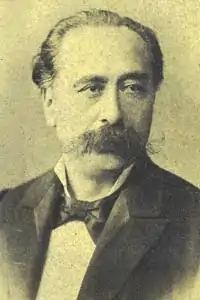Tigran Chukhajian
Tigran Gevorki Chukhajian[1][2] (Armenian: Տիգրան Չուխաճեան,[3] Turkish: Dikran Çuhacıyan; 1837 – March 11, 1898) was an Ottoman Armenian composer and conductor, and the founder of the first opera institution in the Ottoman Empire.[4] He is considered the first opera composer in Turkish history.[5]
Tigran Chukhajian | |
|---|---|
 | |
| Born | 1837 |
| Died | March 11, 1898 Smyrna, Ottoman Empire |
| Other names | Dikran Chouhajian, Tigran Tchoukhajian, Dikran Çuhacıyan |
| Occupation | Composer, conductor |
Biography
Chukhajian was born in Constantinople. He studied at composer Gabriel Yeranian's class, then had classes in Milan. Along with other Armenian intellectuals of that period he fought for the development of national culture, organized Armenian musical societies, theatres, schools, papers and free concerts. In his works, Chukhajian used the elements of European musical techniques and Armenian folk melodies.[6] He is an author of pieces for piano, songs and romances, chamber and symphonic works, operas. His most successful opera was Leblebici hor-hor agha (1875), it was premiered at the French Theatre in Istanbul, it was so successful that during the season it was performed more than hundred times and during the month Ramadan it was performed every single night[7] (Zemire, 1890) etc. In 1862, he took over publication of the Armenian musical journal Armenian Lyre. He died in Smyrna (now İzmir). Chukhajian is buried in the Armenian cemetery of İzmir.
He created the first Armenian opera, Arshak II (1868, partially staged in 1873), based on the historical figure King Arsaces II (Arshak II).[1] The score was considered lost, but was discovered in 1942 and performed in 1945 in a revised version at the Armenian Opera Theater opera theater in Yerevan.[1] Arshak II continued in the repertoire of the Yerevan Opera Theater. In 2001, it was staged at the San Francisco Opera.[8]
Chukhajian is also remembered as the composer of what may have been the first original opera in Turkish, Arif'in Hilesi (Arif's Deception), based on Nikolai Gogol's The Government Inspector.[1]The opera caused a conflict between Chouhajian and Gullu Agop whether it was a vaudeville or opera.It was performed in the Gedikpaşa theatre.[9]
Selected compositions
Operas
- Arshak II (1868)
- Arif'in Hilesi (1874)
- Leblebidji Hor-Hor Agha (1875)
- Zemire (1890)
- Indiana (1897)
References
- Sarkisyan 2001.
- His name is sometimes transcribed as 'Tigran Tchoukhajian' or 'Dikran Tchouhadjian'.
- The Classical spelling of his name in Armenian. In the reformed orthography it is spelled Տիգրան Չուխաջյան
- Donald Jay Grout; Hermine Weigel Williams (2003). A Short History of Opera. Columbia University Press. p. 529. ISBN 978-0-231-11958-0.
- Cowden, Robert H., ed. (1992). Opera companies of the world : selected profiles. New York: Greenwood Press. ISBN 0313262209.
- Чухаджян Тигран Геворгович. Great Soviet Encyclopedia, accessed 22 June 2019.
- Karadağlı, Özgecan. . From Empire to Republic: Western Art Music, Nationalism, and the Merging Mediation of Saygun’s Op.26 Yunus Emre Oratorio. University of Alberta: Unpublished PhD Dissertation, 2017.
- San Francisco Opera Performance Archive, accessed 22 June 2019.
- Karadağlı, Özgecan. Türkiye’ye Müzikli Sahne Sanatlarının Girişi Dikran Çuhacıyan Öncesi ve Sonrası. İstanbul: Unpublished Master's Thesis, 2003.
Bibliography
- Sarkisyan, Svetlana (2001). "Chukhajian, Tigran Gevorki". Grove Music Online. Oxford University Press. doi:10.1093/gmo/9781561592630.article.05728.(subscription required)
- Karadagli, Ozgecan. “From Empire to Republic: Western Art Music, Nationalism, and the Merging Mediation of Saygun’s Op.26 Yunus Emre Oratorio.” University of Alberta Libraries, 2017. https://doi.org/10.7939/R3FQ9QK4S.
- Karadagli, Ozgecan. 2003. “Türkiye’ye Müzikli Sahne Sanatlarının Girisi Dikran Çuhacıyan Öncesi ve Sonrasi. Istanbul : Unpublished Master's Thesis.
Further reading
- Nikoghos Tahmizian, The Life and Work of Dikran Tchouhadjian, trans. Aris Sevag, Pasadena, CA: Drazark Publishing, 2001. (translated from "Dikran Tchouhadjian: gyanku yev steghtazakortzoutiunu," 1999)
External links
| Wikimedia Commons has media related to Dikran Tchouhadjian. |
- Chukhajian – Arsaces II – Aram Katanyan (recording of the opera)
- In the Footsteps of Tchouhadjian — documentary film about Chukhajian